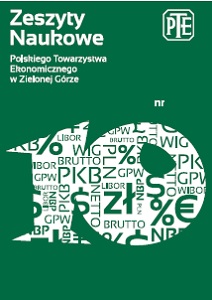Zróżnicowanie poziomu wolności handlowej w państwach członkowskich UE jako efekt krajowych regulacji działalności gospodarczej
Free trade differentiation between European Union countries as a result of national regulations on economic activity
Author(s): Andrzej PestkowskiSubject(s): Economy, Supranational / Global Economy
Published by: Polskie Towarzystwo Ekonomiczne w Zielonej Górze
Keywords: free trade; trade restrictions; fiscal burden; tax systems; wolność handlu; regulacje handlu; obciążenia fiskalne; systemy podatkowe
Summary/Abstract: Despite the long existence of economic community that is the European Union, and consequently the common trade regulationsin fact we could observe the free trade differentiation between European Union countries. Common commercial policy and trade liberalization have not been implemented to the same level in all countries, despite being one of the main objectives of the European Union since the Maastricht Treaty. The legislative possibilities of individual EU members allow to limit an economic freedom, including trade freedom. This article aims to discuss these nuances and identify possible causes and effects of such a state. The methods of solving the problem are focused on the analysis of secondary data, which comes mainly from studies and documents of EU bodies. Literature criticism and qualitative research showing the level of commercial freedom in all EU countries were also used. In conclusion, it was stated that the existence of high discrepancies between EU countries in the level of VAT, the duty-free allowance and tax allowance, increases the inequality in the commercial freedom of entrepreneurs within the community. In addition, different orders and prohibitions on trade have been implemented in individual EU countries, which reduce economic freedom in selected areas of the economy. Inequalities in taxation, together with national trade bans, may have the opposite effect to the one intended by the European Union – mostly deflection of the countries in terms of commercial freedom. A new perspective at the problem is proposed by indicating not only macroeconomic factors, such as differences in taxation, but also factors of a microeconomic nature. The examples of that microeconomic sphere provided in this presentation are the partial ban on Sunday trading introduced by the Polish government in 2018, and also allowing municipals to make the restrictions on the sales of alcoholic beverages at certain hours. A multitude of such national or even regional regulations may significantly differentiate the level of economic freedom within the entire EU Community.
Journal: Zeszyty Naukowe Polskiego Towarzystwa Ekonomicznego w Zielonej Górze
- Issue Year: 6/2019
- Issue No: 10
- Page Range: 141-153
- Page Count: 13
- Language: Polish

